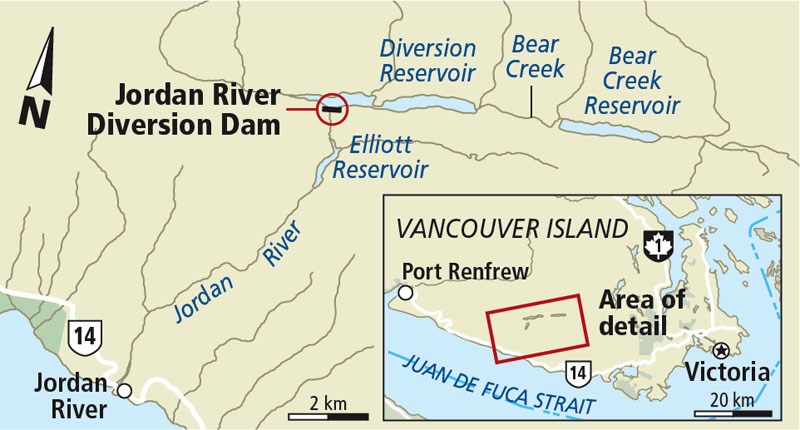B.C. Hydro wants to buy 11 homes in Jordan River because of fears they will be washed away if an earthquake damages the up-river dam.
The decision to approach residents of the homes came after a six-year, $10-million study of all 79 B.C. Hydro dams in the province. It found the Jordan River dam is the most likely to fail in an earthquake.
“The seismic hazards we are left with there are, by a wide margin, the highest in the province, and by extension, the highest in the country,” said Chris O’Riley, B.C. Hydro executive vice-president of generation.
O’Riley said the 11 homes are in an area already posted as a tsunami zone and were identified as sitting in an area likely to be flooded if the dam failed and reservoir water was suddenly released.
Doug Harvey, a 60-year-old retired forest worker and die-hard surfer whose home is one of the 11 targeted for purchase by B.C. Hydro, is angry about being asked to move. He was approached on Thursday by a woman who knocked on his door to deliver a letter by hand.
“I’m just not interested in selling,” Harvey said.
He said he has lived at Jordan River off and on since his 20s. He built the house himself and moved in about five years ago because it’s close to the beach for surfing, fishing and walking the dog. “This is a one-of-a-kind place, right on the ocean,” Harvey said. “How can you replace that?”
O’Riley said B.C. Hydro would offer market prices for the houses.
The corporation’s seismic hazards study also revealed risks for dams on the Campbell River and on the Bridge River near Lillooet on the mainland.
But those risks are not as extreme as Jordan River.
To deal with hazards, B.C. Hydro has announced it will spend $1.9 billion on upgrades at its dams over the next 10 years. Of that, $700 million will be spent on Vancouver Island.
Seismic hazards for dams on most other river systems in the province were found to be stable or less risk than previously thought. Those include dams on the Peace and Columbia rivers, where B.C. Hydro has its biggest power generators.
Mike Hicks, Capital Regional District director representing the Juan de Fuca Electoral Area that includes Jordan River, said more than the houses are at risk.
A restaurant is there, another is planned, a dry-land log sort supports important forest jobs, the CRD has a park and hundreds of people visit to surf.
“It’s a hugely complex problem,” Hicks said. “You can’t just say: ‘We’ve got a problem, let’s move ’em.’ It might even come down to people saying: ‘No, B.C. Hydro should fix their own problem.’ ”
O’Riley said consideration was given to upgrading the Jordan River dam, built in 1911, to make it more capable of withstanding an earthquake.
Experts decided such a plan would be too costly or impractical. It made more sense to buy the properties at risk.
The Jordan River dam is an important supplier of electricity for southern Vancouver Island so reservoir water levels cannot be just taken down, nor can the dam simply be decommissioned.
O’Riley said the dry-land sort and restaurant might not be affected by the new safety concerns. Standards are different for job sites, especially those used only in daylight.
Workers are considered more capable than residents of evacuating if danger occurs, especially since an event can happen day or night. “With residences you are talking about children, you are talking about guests and they might be staying overnight,” O’Riley said.
He emphasized the risk is from a major earthquake. “We are not talking about an emergency or a crisis. We are talking about major earthquakes that might never occur in anyone’s lifetime. But they could also occur any time. They might even occur next week.”



